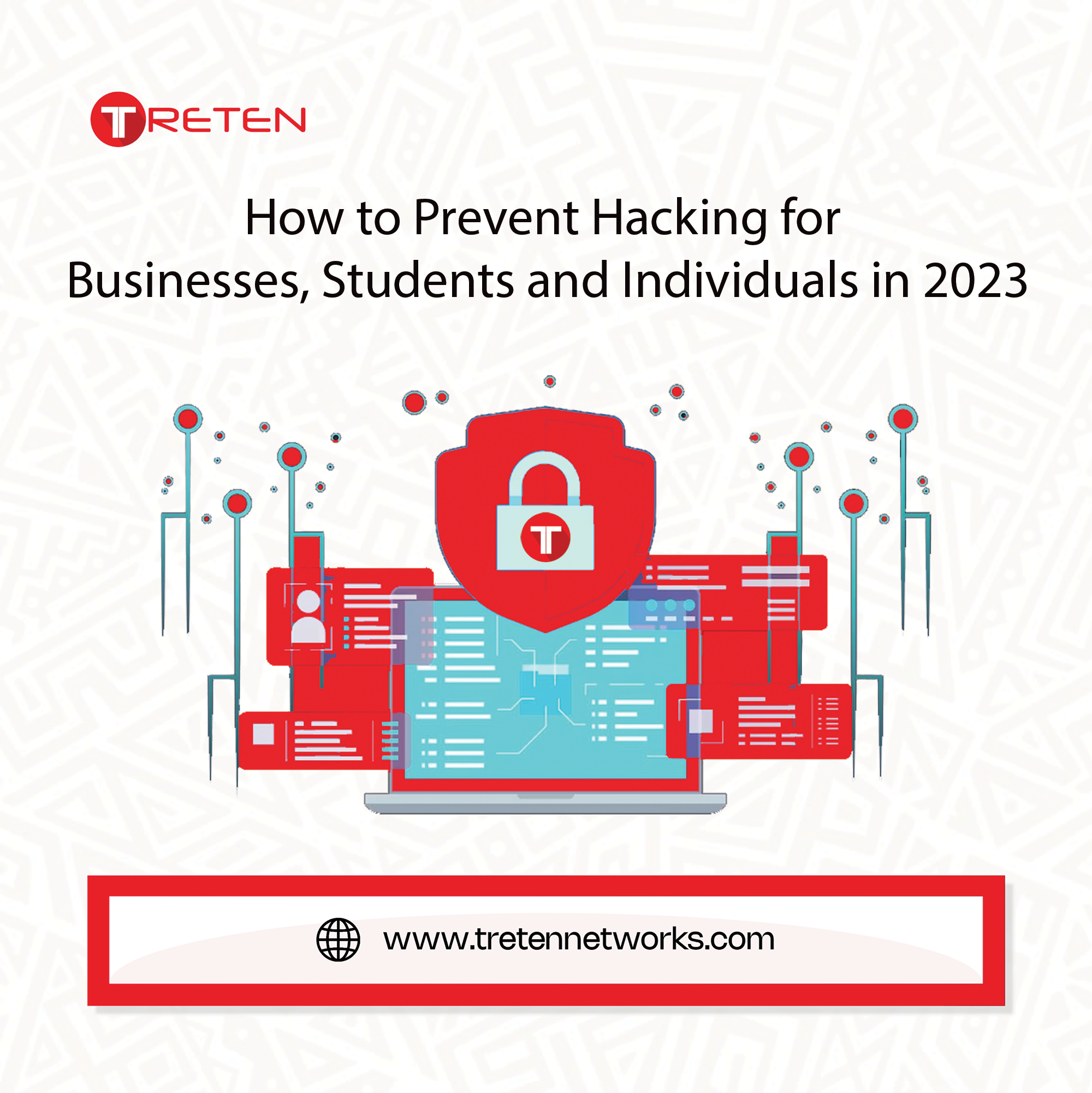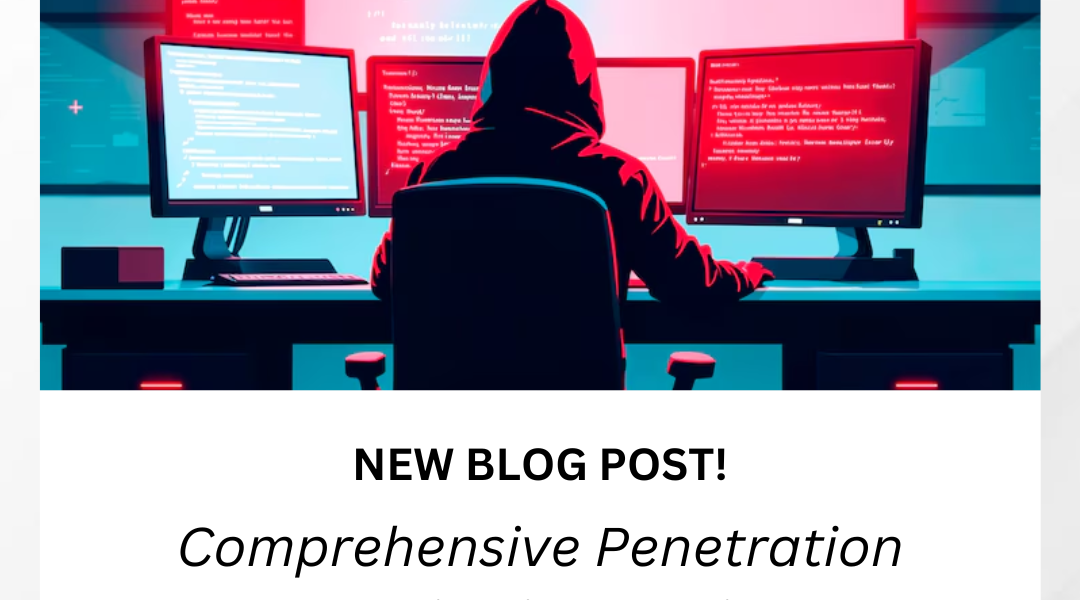How To Prevent Hacking For Businesses, Students and Individuals In 2023
Hacking has become a prevalent threat in today’s digital landscape, influencing businesses, students, and individuals alike. In 2022, the average cost of a data breach for businesses was $4.24 million. And in 2021, 62% of small businesses experienced a cyberattack. Read more
In this thorough guide, we will explore effective strategies to prevent hacking in different conditions, including small businesses, medium businesses, students, and individuals. By implementing these preventive measures, you can fortify your defenses and safeguard against potential cyber threats.
How to Prevent Hacking as a Small Business
Small businesses frequently confront asset limitations when it comes to cybersecurity. However, there are key steps you’ll take to upgrade your security posture and secure your business:
– Frequently update software: Keep all your software up to date, counting operating systems and applications, to prevent exploitation of known vulnerabilities.
– Strong and unique passwords: Utilize complex passwords and avoid reusing them over numerous accounts. Consider employing a password manager for secure password management.
– Enable two-factor authentication (2FA):
Add an additional layer of security by requiring a second form of confirmation, such as a code sent to your mobile device, in addition to passwords.
– Be cautious of phishing emails: Train your workers to identify and avoid suspicious emails which will contain malicious links or attachments.
– Educate employees: Conduct cybersecurity awareness training sessions to teach your employees almost common threats and secure online practices.
– Utilize a firewall: Implement a firewall to monitor and control incoming and outgoing network activity, securing against unauthorized access.
– Frequently scan for vulnerabilities: Utilize defenselessness scanning tools to identify weaknesses in your network infrastructure and address them instantly.
– Backup your data: Maintain regular backups of critical business data to guarantee quick recovery in case of a breach or data loss occasion.
– Develop an incident response plan: Have a clear plan in place to respond to cyber incidents, including steps to contain, explore, and recover from an attack.
– Stay informed: Keep abreast of the most recent cybersecurity trends, developing threats, and best practices to persistently improve your defenses.
How to Prevent Hacking as a Medium Business
As a medium-sized business, you have more resources and capabilities to bolster your cybersecurity. Here are additional preventive measures you can implement:
– Layered security approach: Employ numerous layers of security measures, such as firewalls, antivirus program, intrusion detection systems, and encryption, to upgrade protection.
– Network monitoring: Utilize advanced tools to effectively monitor network traffic for any signs of suspicious movement, empowering quick detection and response to potential threats.
– Security incident response plan: Develop a comprehensive incident response plan that outlines the vital steps to address and mitigate cybersecurity incidents successfully.
– Regular security audits: Conduct periodic security audits to assess the viability of your security controls and recognize areas for enhancement.
– Employee training and awareness: Continuously educate your employees on evolving cyber threats and provide regular training to enhance their cybersecurity knowledge and practices.
– Secure remote access: Establish secure remote access protocols, including virtual private networks (VPNs) and multi-factor authentication, to protect remote workers and sensitive data.
– Data classification and access controls: Classify your data based on its sensitivity and implement access controls to restrict unauthorized access to critical information.
– Incident reporting and information sharing: Foster a culture of reporting incidents internally and sharing threat intelligence with relevant authorities and industry partners.
How to Prevent Hacking as a Large Business
Large businesses possess substantial resources and infrastructure, enabling them to implement robust security measures. Consider the following strategies to safeguard your organization against hacking:
– Zero-trust security model: Adopt a zero-trust approach, assuming no user or device can be trusted by default. Implement strong authentication and granular access controls.
– Advanced threat detection and prevention: Deploy advanced security tools, such as intrusion prevention systems (IPS), behavior analytics, and threat intelligence platforms, to proactively identify and prevent sophisticated attacks.
– Security operations center (SOC): Establish a dedicated SOC to continuously monitor your network, respond to security incidents, and conduct threat hunting activities.
– Regular penetration testing: Conduct regular penetration testing to distinguish vulnerabilities in your systems and applications, ensuring they are addressed before malicious actors abuse them.
– Continuous employee training: Provide comprehensive cybersecurity training to workers at all levels, including executives, to cultivate a culture of security awareness and vigilance.
– Red team exercises: Conduct simulated attacks and penetration tests internally to assess your organization’s readiness and identify potential security gaps.
– Vendor risk management: Implement a robust vendor risk management program to ensure third-party suppliers adhere to stringent security standards, minimizing the risk of supply chain attacks.
– Incident response tabletop exercises: Regularly simulate cyber incident scenarios to evaluate and enhance your organization’s response capabilities and coordination.
– Threat intelligence sharing: Collaborate with industry peers, government agencies, and cybersecurity communities to exchange threat intelligence and stay informed about emerging threats.
– Continuous improvement: Regularly review and update your security policies, procedures, and controls based on emerging threats and evolving industry standards.
How to Prevent Hacking as a Student
As a student, it’s crucial to be proactive in protecting yourself from hacking and safeguarding your personal information. Here are some effective measures you can take:
– Keep software up to date: Regularly update your devices’ operating systems, web browsers, and applications to ensure you have the latest security patches and bug fixes.
– Create strong and unique passwords: Use complex passwords for your online accounts and avoid reusing them. Consider using a password manager to securely store and manage your passwords.
– Enable two-factor authentication (2FA): Activate 2FA whenever possible to add an extra layer of security to your online accounts. This requires a second verification step, such as a unique code sent to your mobile device.
– Be cautious of phishing attempts: Stay vigilant against phishing emails and messages that may attempt to trick you into revealing personal information or clicking on malicious links. Verify the source before providing any sensitive information.
– Secure your devices on public Wi-Fi: When connecting to public Wi-Fi, use a virtual private network (VPN) to scramble your internet activity and secure your information from potential eavesdropping.
– Be mindful of what you share online: Be cautious about sharing individual data on social media platforms and avoid posting delicate details that can be exploited by hackers.
– Regularly back up your data: Create backups of your vital records and documents to an external storage device or cloud storage. This ensures that even if your device is compromised, you can still recover your data.
– Use antivirus software: Install trustworthy antivirus program on your devices and keep it up to date. This will help identify and block any malicious software or viruses.
– Stay informed about cybersecurity: Stay updated on the latest cybersecurity threats, trends, and best practices. Educate yourself through reliable sources to better understand how to protect yourself online.
– Be cautious when downloading files: Only download files from trusted sources and verify the integrity of the files before opening them to avoid potential malware infections.
– Lock your devices: Set up password or biometric locks on your devices to prevent unauthorized access.
– Report any suspicious activity: If you encounter any suspicious online activity or believe your accounts may have been compromised, report it to your educational institution or appropriate authorities.
By following these preventive measures, you can significantly reduce the risk of falling victim to hacking attempts and protect your personal information as a student. Stay proactive and prioritize your cybersecurity.
If your organization is located in Lagos, Abuja, Nigeria, UAE, the United Kingdom, Canada, Ghana, Cameroon, Rwanda, Ethiopia, or the British Virgin Islands, we invite you to reach out to Treten Networks today. We would be delighted to discuss your specific needs and collaborate in developing a comprehensive cloud migration process.


